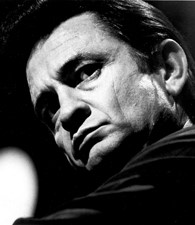Johnny Cash—the “Man in Black”—is an American legend. His music epitomizes the life and landscape of the American South, and has influenced generations of artists. His complex life inspired the 2005 critically acclaimed film “Walk the Line.”
Johnny Cash’s Early Days
Johnny Cash was born John R. Cash on February 26, 1932, in Kingsland, Arkansas. He grew up one of six children on a farm in Dyess Colony, a small town in northwest Arkansas, where his family grew cotton and other crops.
Cash was greatly influenced by his mother’s love of folk music and hymns. He also absorbed the work songs from the local fields and railroad yards. Songs like “Pickin’ Time,” “Five Feet High and Rising” and “Look at Them Beans” draw from his early life. As Cash wrote in his autobiography, “in Arkansas, a way of life produced a certain kind of music.”
Nevertheless, Cash’s childhood was far from idyllic. The family was poor, the farm was devastated by flood and insects, and Cash’s father may have been abusive. When Cash was 12, his brother, Jack, died in an accident, an event that Cash said haunted him all his life.
Sources in this Story
- Johnny Cash: Biography
- Slate magazine: Johnny Cash Slept Here
- The Guardian: The Man in Black reaches the end of the line
- YouTube: Johnny Cash – San Quentin (Live from Prison)
- findingDulcinea: Happy Birthday, June Carter Cash
- The New York Times: Johnny Cash’s Journey Through the Other Side of Virtue
Notable Accomplishments
Cash wrote his first hit, “Folsom Prison Blues,” while stationed in Landsberg, Germany, as a radio operator with the air force; his band was called the Landsberg Barbarians.
Discharged in 1954, Cash returned to the United States and married his sweetheart, Vivian Liberto, whom he had met during basic training in Texas. The pair moved to Nashville, where Cash did odd jobs and pursued a record deal, hoping to record gospel music.
A year later, Cash was recording with Sun Records, although the label did not want Cash performing gospel. Cash’s first song with the label, “Hey Porter” was not a success, but his second track, “Cry, Cry, Cry” reached number 14 on Billboard. The trend continued: “So Doggone Lonesome” and “Folsom Prison Blues” were both top 10 hits. “I Walk the Line” went to number one in 1956 and remained there for 43 weeks, selling more than two million copies.
Cash also began performing at prisons across the country. “Convicts are the best audience I ever played for,” Cash said. The performances were part of his general concern and advocacy for marginalized groups. He was an especially ardent advocate for Native Americans. During this time, Cash came to be known as “The Man in Black,” for the clothing color he preferred.
As Cash’s fame grew, television and tour dates filled his schedule, which took a toll on the musician; by the early 1960s, Cash was a heavy user of amphetamines and barbiturates. His marriage dissolved, and the addictions began damaging his career as well.
In 1967, with the help of his singing partner (and a year later, his wife), June Carter, Cash turned his life around. The pair toured with great success and in 1969, Cash’s records outsold the Beatles. Cash also hosted “The Johnny Cash Show” on TV from 1969–1971.
During his career, Cash won 11 Grammy awards and six Country Music Awards. He was inducted into the Country Music Hall of Fame in 1980 and into the Rock and Roll Hall of Fame in 1992. President Bill Clinton also honored Cash with a lifetime achievement award in 1996.
The Man and His Work
- “Cash: The Autobiography” by Johnny Cash
- “The Essential Johnny Cash”
- “The Legend of Johnny Cash”
- “At Folsom Prison: Legacy Edition”
- “Walk the Line” (DVD)
The Rest of the Story
Despite the support he received from his second wife, June Carter Cash, Cash was plagued by addiction throughout his life.
Johnny Cash died on September 12, 2003, just a few months after June passed away. Doctors attributed his death to complications from diabetes; he also suffered from glaucoma and Shy-Drager Syndrome, a degenerative neurological disorder. Cash once reflected: “People say, well, he wore that body out. Well, maybe I did. But it was to a good purpose.”
Indeed, it may have been the struggles and addictions that gave Cash his grit and appeal. Nicolas Kulish of The New York Times argued that Cash’s voice and music had a power and honesty unmatched by more polished and skilled musicians.
This article was originally written by Isabel Cowles; it was updated January 10, 2017.











